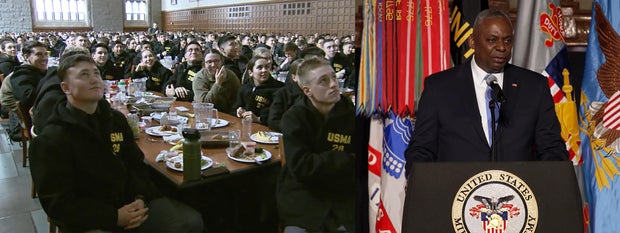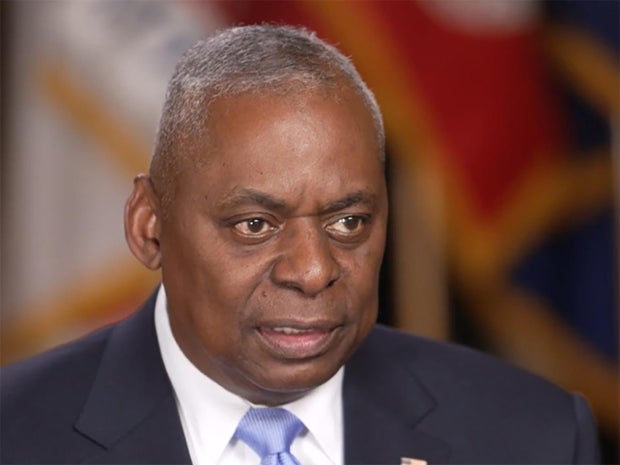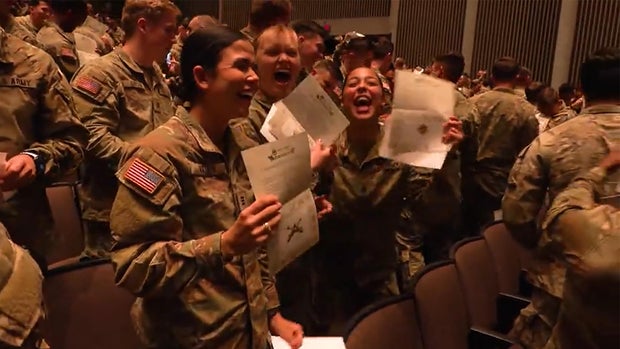Defense Secretary Lloyd Austin on the strength of a diverse military
Earlier this month, Lloyd Austin, the nation's first African American secretary of defense, returned to West Point, the institution that forever changed his life. "When I first came to West Point," he told the corps of cadets, "I had never been north of Georgia."
He spoke to the nation's next generation of Army officers about what it means to lead in combat: "Artillery was exploding all around us. The troops in the TOC [Tactical Operations Center] were watching me intently, waiting to hear what I had to say. And at that moment, I realized that they would follow me through fire if they trusted that I knew the way forward."
When the U.S. invaded Iraq in 2003, Austin was giving the orders for the lead Army division. "I was calling the shots in terms of where brigades were moving, and so I needed to be right up at the front of the formation," he said.
He ordered what became known as the "Thunder Run" into the heart of Baghdad. He would return to Iraq for two more tours. That's how he met then-Vice President Joe Biden, who was the Obama administration's point man for Iraq. "I would be with him as he visited our troops, but he'd also ask for my thoughts, my opinion," Austin said.
I asked, "When Joe Biden was elected president, did you expect to become secretary of defense?"
"I did not," Austin replied. "And matter of fact, that was the furthest thing from my mind."
But he admits he loves his job.
That job consists of non-stop closed-door meetings with senior officials, both in the Pentagon and around the world by teleconference. At one such meeting focused on Ukraine, Austin said, "It's been very helpful in terms of making sure that everyone is kind of rowing in the same direction."
There is also constant travel, circling the globe visiting allies and troops.
Despite his high-profile job, he is a reluctant public figure. "It's my personality," he said. "I don't make excuses for that. But I don't think being a private person is necessarily a bad thing."
I asked, "Do you think it had anything to do with being a Black officer in a white-dominated institution?"
"It does," he said.
It got him in trouble when he tried to keep his prostate cancer secret even from the president. At a February 1, 2024 press conference, Austin said, "I should have informed my boss; I did not. That was a mistake."
This private person nonetheless had to stand up in the Pentagon's briefing room and talk for an hour about his prostate. He says he is now cancer-free. "I thank God for that," he said.
His knees have seen a few too many parachute jumps. But back at West Point nearly 50 years after he graduated, he seemed to be basking in the limelight, although he was sharing it with the Army football team having one of its best seasons ever.
At West Point, football is not just a sport; it's preparation for battle. "They're just tough and rugged and play together, and that's what we gotta be," said coach Jeff Monken, who has turned Army football around. "It's gotta be teamwork. That's the lesson they take from this place into the Army."
"That's how you're going to fight," said Austin. "You're not going to win a war by yourself."
Army was undefeated until they ran into Notre Dame, and lost by five touchdowns. Ironically, Notre Dame had been Austin's first choice to attend: "I'd applied there first, got accepted, got a scholarship, and then I got accepted at West Point," he recalled. "My father brought me in and said, 'Hey, you go to Notre Dame, it's still gonna cost me money. If you go to this school, it's a great education, and they pay you to go there!'"
"His logic persuaded you," said Monken.
In high school, Austin's nickname was "Blade," courtesy of his school's football coach. "I was a very thin, kind of wiry young man," Austin recalled. "I said, 'Coach, put me in,' and he said, 'Son, they're going to mow you down like a blade of grass.'"
Austin ended up as captain of his high school basketball team in Georgia. He was also one of the people that helped to integrate his school. "I was one of the first students there," he said, describing the experience as tough.
Over and over, Austin has broken through as the first African American, and has said that he was in situations where he "can't" fail. "I've been in that 'can't fail' position a lot," he said. "The first African American to be the vice chief of the Army; the first African American to command a division in combat; the first African American to command an entire theater of war."
He is Exhibit A for anyone who believes the military is a true meritocracy, where you are judged by what you do, not what you look like. But he has been depicted by right-wing firebrands as the leader of a "woke" military which promotes minorities at the expense of war fighting.
In an April 5, 2022 exchange on Capitol Hill, then-Rep. Matt Gaetz, Republican from Florida, made accusations to Austin about leaders being "woke":
Gaetz: "So while everyone else in the world seems to be developing capabilities and being more strategic, we got time to embrace 'critical race theory' at West Point."
Austin: "The fact that you're embarrassed by your country, by your military? I'm sorry for that."
Gaetz: "No, no, no. I'm embarrassed by your leadership. I am not embarrassed for my country. The Biden administration is trying to destroy our military by force-feeding it 'woke-ism.'"
I asked Austin, "Why is it that that presses your button and all the other criticism just rolls off?"
"I've fought alongside these troops," he replied. "This is a lethal, professional war-fighting machine."
A machine Austin drove to Baghdad with battlefield daring that critics say has been lost as America became mired in never-ending wars, culminating in the chaotic withdrawal from Afghanistan.
Appearing on Fox News in June, Pete Gegseth, Donald Trump's pick to be the next secretary of defense, said, "Ramming stuff into the Pentagon that has nothing you do with winning wars – what is your gender? What is your race? … The Pentagon likes to say our diversity is our strength. What a bunch of garbage!"
But Austin said he absolutely disagrees with criticism that the drive to include women in all the combat arms has led to a weaker military. "You know, I've seen women in combat. I don't have to guess at this," he said.
Women were part of his command team during the Iraqi invasion. "I said, 'If any of you feel that you don't want to be there at the front of the fight, say so now and I won't think any less of you.' One of the women piped up and said, 'Sir, what are you talking about?' And what they were telling me was, 'Quit talking. Let's get to the fight.'"
One woman eager to get to the fight is First Captain Caroline Robinson, the top cadet in West Point's Class of 2025. Fifty years ago, when Austin graduated, there were no women here. "And I think because of that, we probably missed a pretty significant part of the population," he said.
As the top cadet, Robinson can have her pick of any branch in the Army. "So right now, field artillery is my number one branch choice," she said.
On December 4, "Branch Night," the cadets of 2025 – one-quarter of them women, and 10 percent African American – found out where they will serve, when they opened envelopes containing their branch assignments.
Fifty years ago, there was no such thing as a female artillery officer, or a Black secretary of defense. In response to critics who rail against diversity in the armed forces, Austin told the cadets, "Any military that turns away tough, talented patriots, women or men, is just making itself weaker and smaller. So, enough already!"
For more info:
Story produced by Mary Walsh. Editor: George Pozderec.








